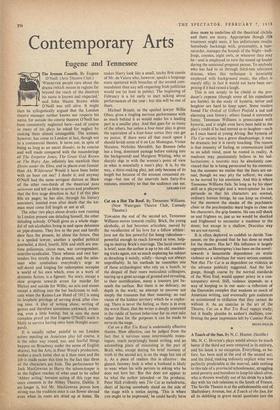Contemporary Arts
Eugene and Tennessee
The Iceman Cometh. By Eugene
O'Neill. (Arts Theatre Club.) 'WHEREVER people care about the drama (which means in regions far beyond the reach of the theatres) his name is known and respected,' said John Mason Brown while O'Neill was still alive. It might then be syllogistically argued that the London theatre manager neither knows nor respects his name, for outside the coterie theatres O'Neill has been consistently neglected here—and of course in many of his plays he asked for neglect by making them almost unstageable. The iceman, however, has come to London at last, though not to a commercial theatre. It turns out, in spite of being as long as an uncut Hamlet, to be concise and well made compared with the maunderings of The Emperor Jones, The Great God Brown or The Hairy Ape, infinitely less mawkish than Desire under the Elms, and in places even funnier than Alt, Wilderness! Would it have been better with an hour cut out? I doubt it, and anyway O'Neill had the same arrogant distrust as Shaw of the other two-thirds of the theatrical pons asinorum and left so little to actors and producers that the first stage direction in Act I of this play fills six pages; he has also, through his literary executors, insisted even after death that the ice- man must come full length or not at all.
The other two plays about drunks now running in London present one deluding himself, the other deluding nobody. O'Neill gives us a whole stage- ful of sub-alcoholics living in and upon delusions or pipe-dreams. They live in the past and hardly dare face the present, let alone the future. One is a spoiled lawyer, another a spoiled political journalist, a third, fourth, fifth and sixth are one- time policeman, circus man, war correspondent, anarcho-syndicalist. Three whores and two bar- tenders live strictly in the present, and the sales- man who symbolises everybody's urge to self-deceit and longing for redemption occupies a world of his own which, even in a work of dramatic fiction, is a figment. No story, except a slow progress towards arrest for murder for Hickey and suicide for Willie; no acts and scenes except a shifting into the bar backroom to indi- cate when the Raines-Law Hotel of 1912 is using its loophole privilege of serving drink after clos- ing time. A play of writing alone, writing of genius and therefore sometimes awkward, irritat- ing, even a little boring; but in sum the most complete proof yet that Eugene O'Neill's work is likely to survive having once been thought avant- garde.
It is usually rather, painful to see London actors mauling an American play (of course, it is the other way round, too, and fearful things happen on Broadway under the name of English drama), but the Arts, in Peter Wood's production, makes a much better shot at it than most and the job is made easier this time by the fact that three of the characters are Irish. The performance by Jack MacGowran as Harry the saloon-keeper is in the highest reaches of what used to be called `Abbey acting,' because acting of this type was once common in the Abbey Theatre, Dublin. It no longer is, but Mr. MacGowran proves how strong was the tradition since it can flower abroad even when its roots are dried up at home. He
makes Harry look like a small, tetchy first cousin of Mr. de Valera who, however, speaks a language more spattered tvith breaches of the second com- mandment than any self-respecting Irish politician would use (at least in public). The beginning of February is a bit early to start talking about performances of the year : but this will be one of them.
Michael Bryant, as the spoiled lawyer Willie Oban, gives a tingling nervous performance with as much behind it as would make his a leading part in a smaller play. And that goes for so many of the others, but unless a four-hour play is given the equivalent of a four-hour notice they can get no justice. If there were all that much space I should lavish some of it on Lee Montague, Vivian Matalon, Nicholas Meredith, Ian Bannen (who has a long, dominant passage before sinking into the background) and Margaret Whiting, who so sharply digs in with the woman's point of view in what is essentially a man's play. It is, by the way, a thirst-making play, not only because of its length but because of the amount consumed on- stage—but one of the intervals lasts forty-five minutes, ostensibly so that the audience can eat.
GERARD FAY


































 Previous page
Previous page